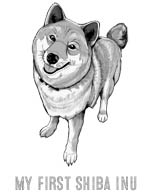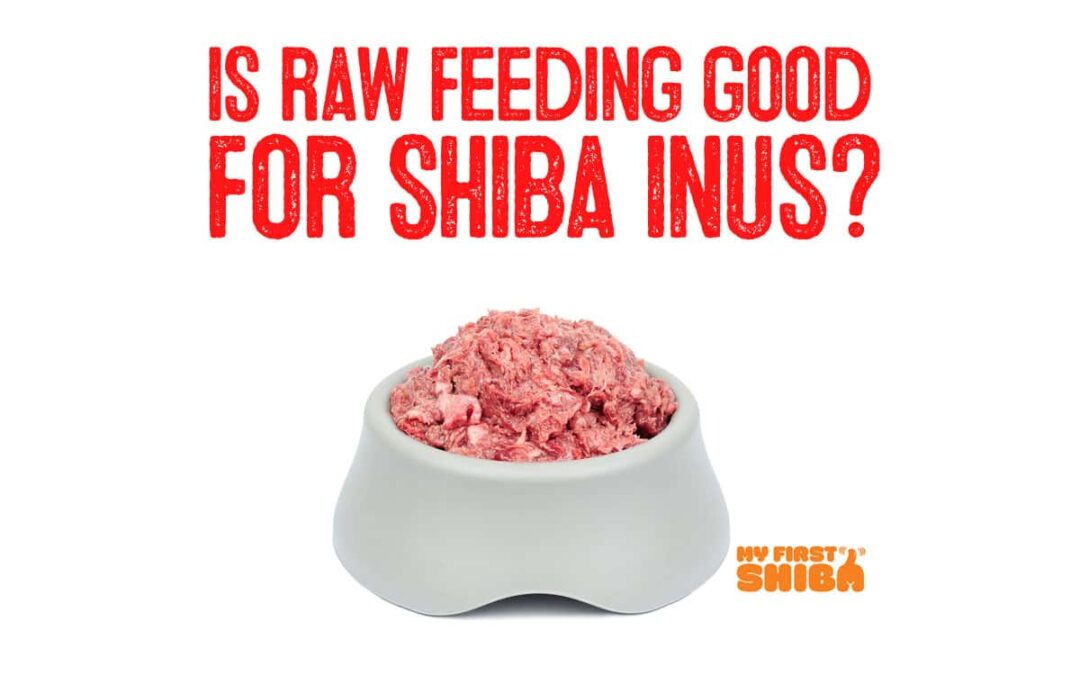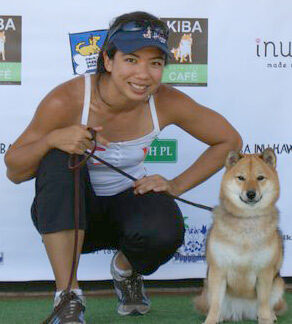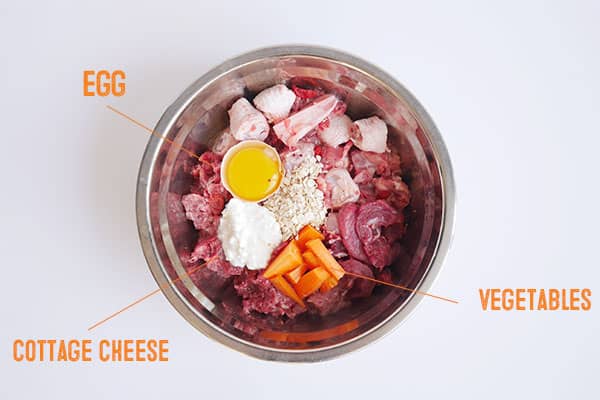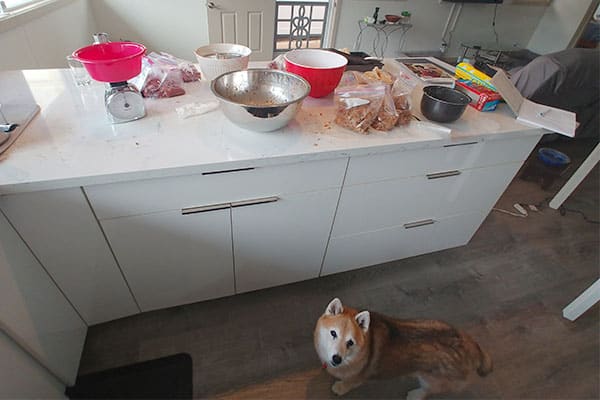On occasion, our posts contain affiliate links. However, we only recommend products that we truly believe in. For more information, visit my privacy policy page.
Author: Jennifer Tsukamoto
Should you feed your Shiba Inu a raw diet?
And if so – why, and how?
In this article, we’ll teach you the in’s and out’s of raw feeding and if this type of feeding will benefit your Shiba Inu.
What is a Raw Diet?
A typical raw diet, sometimes referred to as an biologically appropriate raw food, (BARF), and / or raw meat-based diets (RMBDs),consists of raw meat, organs, and bone.
To achieve a balanced diet as laid out by the NRC or Nutrient Research Council, these raw diets must also contain supplements (natural and / or synthetic).
Types of Raw Diets Available For Dogs
Home-prepared raw diets – To ensure that your home-prepared diet is balanced, you should consult with a veterinary nutritionist, especially if you have never prepared fresh food for your Shiba before.
Commercial frozen raw complete and balanced diets – When choosing this diet, it’s important to ensure that the company that produces this food is reputable and ha consulted with a veterinary nutritionist for the formulation of their diets.
Commercial frozen raw, freeze-dried diets that are “not” completely balanced – These types of diets need to have additional supplementation to be considered a “complete” meal. You can use these types of diets to supplement your current meal that is balanced
Commercial freeze-dried complete and balanced diets – This type of diets uses an advanced freeze-drying method that leaves the food almost unchanged when compared to other drying methods. Freeze-drying does kill some of the bacteria found in raw food. Freeze-dried raw dog foods are one of the most expensive options for feeding raw.
Commercial high pressure pasteurized (HPP) complete and balanced diets – This type of diet subjects the food to high pressure (43 500 to 87 000 psi) without heating. This process kills most bacteria including Salmonella and Listeria without affecting nutritional quality.
The Pros of Feeding Your Shiba Inu a Raw Diet
By far, the biggest pro of raw feeding is the fact that you are providing your Shiba with FRESH foods free from excessive processing.
Feeding your Shiba any fresh and balanced food that is not kibble has so many other benefits as well.
Most kibble is carb-heavy and loaded with low-cost “filler” foods that have been exposed to intense processing.
Another benefit of raw foods is that these foods are exposed to less carcinogens and oxidative stress caused by the cooking process.
There are some studies that suggest raw diets may have a positive effect on immune function.
This is not surprising because 70% to 80% of each dog’s immune system is located in the intestinal wall tract.
However, as of yet, there are no objective controlled studies that link raw feeding to direct health benefits however multiple non-peer reviewed studies suggest that fresh, raw feeding has benefits for canine allergies, atopy, gastrointestinal issues, epilepsy, and cancer.
The Cons of Feeding Your Shiba Inu a Raw Diet
The most concerning con of raw diet feeding is the danger of not providing your dog with a balanced meal.
No matter what you feed your Shiba, if he or she is not getting the right nutrition – serious and adverse health issues can occur.
Understanding how to balance a dog’s meal takes a bit of knowledge which is why consulting with a veterinary nutritionist is always recommended.
Yet, even commercially produced raw diets can be nutrient deficient – even the ones that claim to be “balanced”.
This is why it’s critical to do research before choosing a company that you feel meets and even better, exceeds your expectations in providing your family member with a healthy and balanced meal.
Many smaller companies that fall off the radar from FDA labeling requirements sell raw dog meals that are obviously not balanced – despite the labeling indicating that they are.
The next negative of feeding raw is an obvious one – the fact that you’ll be exposed to pathogens such as Salmonella spp, Campylobacter spp, Clostridium spp, Escherichia coli, Listeria monocytogenes, and Enterotoxigenic Staphylococcus aureus.
So while it’s true that “most” healthy dogs can handle the presence of these pathogens, we as humans are still susceptible to getting ill from being exposed to it.
Also, older dogs and dogs with compromised immune systems should not be fed raw proteins due to their lower immune function. It’s just not worth the risk.
Older dogs shouldn’t be fed raw foods because raw foods are more voluminous than cooked foods. This means that the dog would have to eat more food to get enough nutrients – something that many older Shibas could struggle with.
So What’s The Verdict: Should I Feed My Shiba Inu a Raw Diet?
I believe that “you can” supplement your Shiba’s diet with occasional fresh raw meats – however I don’t recommend feeding your Shiba solely a raw diet.
Lightly-cooked fresh foods only lose a small portion of their total nutritive value – and some foods actually more nutritious cooked versus raw.
So basically you get almost all of the benefits of feeding raw minus the numerous negatives.
Dealing with the handling of raw foods that commonly have pathogens is not something I’d want to have in my household on a regular basis.
And the risk for contamination doesn’t stop at the handling stage.
Your Shiba Inu still needs to consume their food and will possibly harbor pathogens on their mouths for a period of time.
So that would would be another unnecessary detail I’d have to worry about – yes, I’m a bit of a clean freak.
Additionally, feeding your Shiba Inu a 100% raw diet will take a lot of time in terms sourcing raw proteins, cutting / grinding, packing, storing, after-prep clean up.
Lot’s of freezer space, lot’s of work!
You could of course purchase ready-made raw meals but that’s going to make the already high costs of feeding raw go up even higher.
Plus, you’ll be taking additional risks in terms of contamination as you’ll have to put your trust in the raw food company that you purchase from.
And one of the final reasons I don’t give my Shibas a 100% raw diet is that I know my Shibas like diversity and appreciate both healthy as well as delicious food.
Some Shibas can be finicky eaters and may not appreciate the bland taste of raw protein every day.
Finally, older Shiba Inus should not be fed a solely raw diet as their immunity is lower and eating raw food takes much more effort than eating cooked food – a dog needs to eat more raw food by volume to get the same nutrition as lighly cooked foods.
However, I do supplement all of Shibas diet with raw offerings occasionally – especially when source something really fresh.
My favorite type of protein to provide raw is beef though I do provide various types of raw proteins that I feel are safe to consume.
There you have, hope this article has helped you understand the pros and cons of feeding and or supplementing your Shibas diet with raw food.
Stay tuned for more how-to articles and videos covering how I feed my five Shiba Inus raw!
Finding an Ethical Shiba Inu Breeder in California
Thanks for visiting Myfirstshiba.com! We do our very best in providing our readers with awesome content about our beloved Shiba Inu breed. Some of our articles include reviews and recommendations to our favorite products. We do occasionally earn commissions from certain affiliate links that help support our work and mission. Thanks again for visiting. Shiba Kisses To All!
